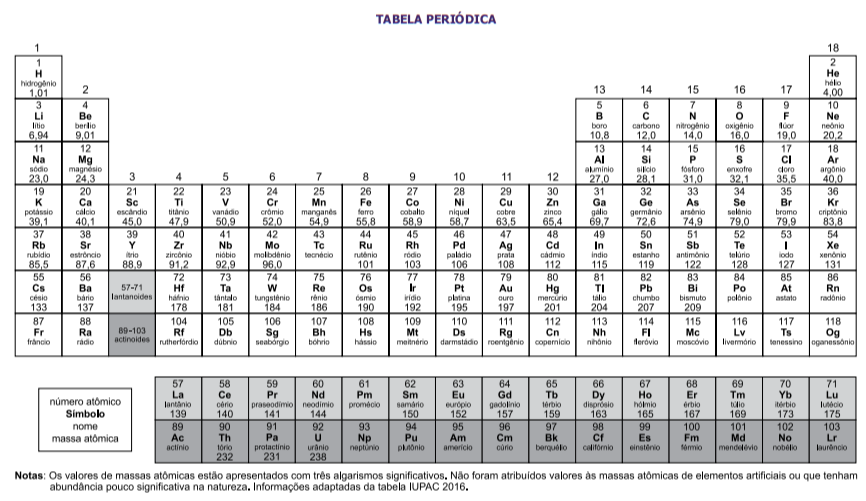Questões Militares
Para pm-sp
Foram encontradas 5.462 questões
Resolva questões gratuitamente!
Junte-se a mais de 4 milhões de concurseiros!
Aproximadamente, 30% da área do município de São Paulo são cobertos por remanescentes de Mata Atlântica, representados em verde na figura a seguir.

Nesses remanescentes, ainda hoje, é possível identificar novas espécies, como a descoberta de um novo tipo de canela-sassafrás (Ocotea koscinskii, Baitello&Brotto), encontrado na região sul da cidade de São Paulo. Essa planta produz fruto, de cuja semente é extraído um óleo de propriedades medicinais.
Pelas características descritas, essa planta pertence ao grupo
das

A combustão completa do eicosano, um dos componentes da parafina utilizada para formar velas, é representada pela seguinte equação, não balanceada:
___ C20H42 + ___ O2 → ___ CO2 + ___H2O
Nessa equação, quando o coeficiente estequiométrico do
eicosano for 2, o do oxigênio será

O indicador vermelho de fenol apresenta cor amarela em
soluções aquosas de pH < 6,4, e, cor vermelha, em soluções
aquosas de pH > 8,2. Na água pura (pH = 7,0), esse indicador
apresenta cor laranja.
A uma amostra de água pura foi acrescentado o indicador vermelho de fenol. Em seguida, foi acrescentado certo óxido que mudou a cor apresentada por esse indicador de laranja para amarela. Esse óxido pode ter sido o


Uma forma de purificar o sal cloreto de amônio, NH4Cℓ, é a descrita a seguir.
O sal é aquecido, passando diretamente ao estado gasoso, sem passar pelo estado líquido. O gás obtido é resfriado, passando diretamente ao estado sólido, sem passar pelo estado líquido. O sal obtido pelo resfriamento do gás é mais puro do que aquele que foi aquecido.
Esse processo de purificação é conhecido como
Na aula de física, o professor discute com seus alunos a associação de resistores apresentada na figura. Ela é formada por 5 resistores idênticos, ligados à fonte de tensão V.

Durante o experimento, o resistor R3 queima, e, como resultado da medida da intensidade da corrente elétrica que atravessa o resistor R1 , foi obtido valor igual a 4 A.
A medida da intensidade da corrente elétrica que atravessará
os resistores R2
, R4
e R5
será, em ampères, respectivamente,
igual a
Os cadetes cumprem uma rotina intensa composta por diversas atividades. Em uma atividade de campo, foi necessário improvisar, para o aquecimento da água, um coletor solar térmico, composto, dentre outras partes, por uma serpentina por onde circula água pura à vazão de 18 L por hora.

Se ao entrar na serpentina, a temperatura da água, pura, era de 15 °C e atingiu temperatura de 35 °C na saída, a quantidade de energia fornecida à água a cada segundo foi, em J, igual a
Dado: cágua = 4,2 kJ/kg. °C
Utilizado pelo exército, o jeep é um utilitário ágil, de fácil dirigibilidade e capaz de acessar terrenos íngremes, acidentados, com lama ou com outras dificuldades.
Considere o deslocamento de um desses jeeps, de massa igual a 1060 kg, transportando dois militares sobre uma superfície plana e horizontal.

O gráfico ilustra o comportamento da energia cinética do sistema (jeep + militares) em função do quadrado de sua velocidade.

Se os dois militares possuem a mesma massa, conclui-se
que cada militar tem, em kg, massa igual a
Na tabela, são apresentadas informações sobre o número de armas apreendidas pela Polícia Militar do Estado de São Paulo, no segundo semestre de 2018.

Se uma pesquisa utilizar a média aritmética simples do
número de armas apreendidas, mensalmente, no segundo
semestre, pela Polícia Militar do Estado de São Paulo, e outra
pesquisa utilizar a mediana do número de armas apreendidas
no segundo semestre, a diferença entre a mediana e a média
será de
 com o objetivo de atingir um
ponto B. Fixando-se como (0, 0) as coordenadas do ponto A
em um sistema de coordenadas cartesianas, cujo eixo das
abscissas, com unidade em metros, representaria o referido
solo, a ordenada do ponto B seria igual a zero, e a abscissa
desse ponto seria igual a
com o objetivo de atingir um
ponto B. Fixando-se como (0, 0) as coordenadas do ponto A
em um sistema de coordenadas cartesianas, cujo eixo das
abscissas, com unidade em metros, representaria o referido
solo, a ordenada do ponto B seria igual a zero, e a abscissa
desse ponto seria igual a 
Com essas 7 peças, sem sobrepô-las, podem-se formar várias figuras, como a de uma casa, a de um gato, a de um cisne, além de figuras geométricas, como a do quadrado, representado acima. Considerando-se todos os ângulos internos das tans, representam-se como α e β as medidas, em graus, do maior e do menor desses ângulos. Nesse caso, α + β corresponde à medida de um ângulo
Em 2015, uma grande empresa petrolífera iniciou o processo de reutilização da água usada para o resfriamento das peças que produzia e fez uma projeção de aumento gradual, em progressão aritmética, até o ano de 2050, do volume de água que será reutilizada, ano a ano.
A tabela apresenta os volumes da água reutilizada, nos primeiros 3 anos:

Considere que An seja o termo geral da progressão aritmética que indique o volume de água reutilizada, em milhões de m3 , com n = 1, representando o volume de água reutilizada no ano de 2016, n = 2, representando o volume de água reutilizada no ano de 2017, e assim sucessivamente.
Nessas condições, tem-se que